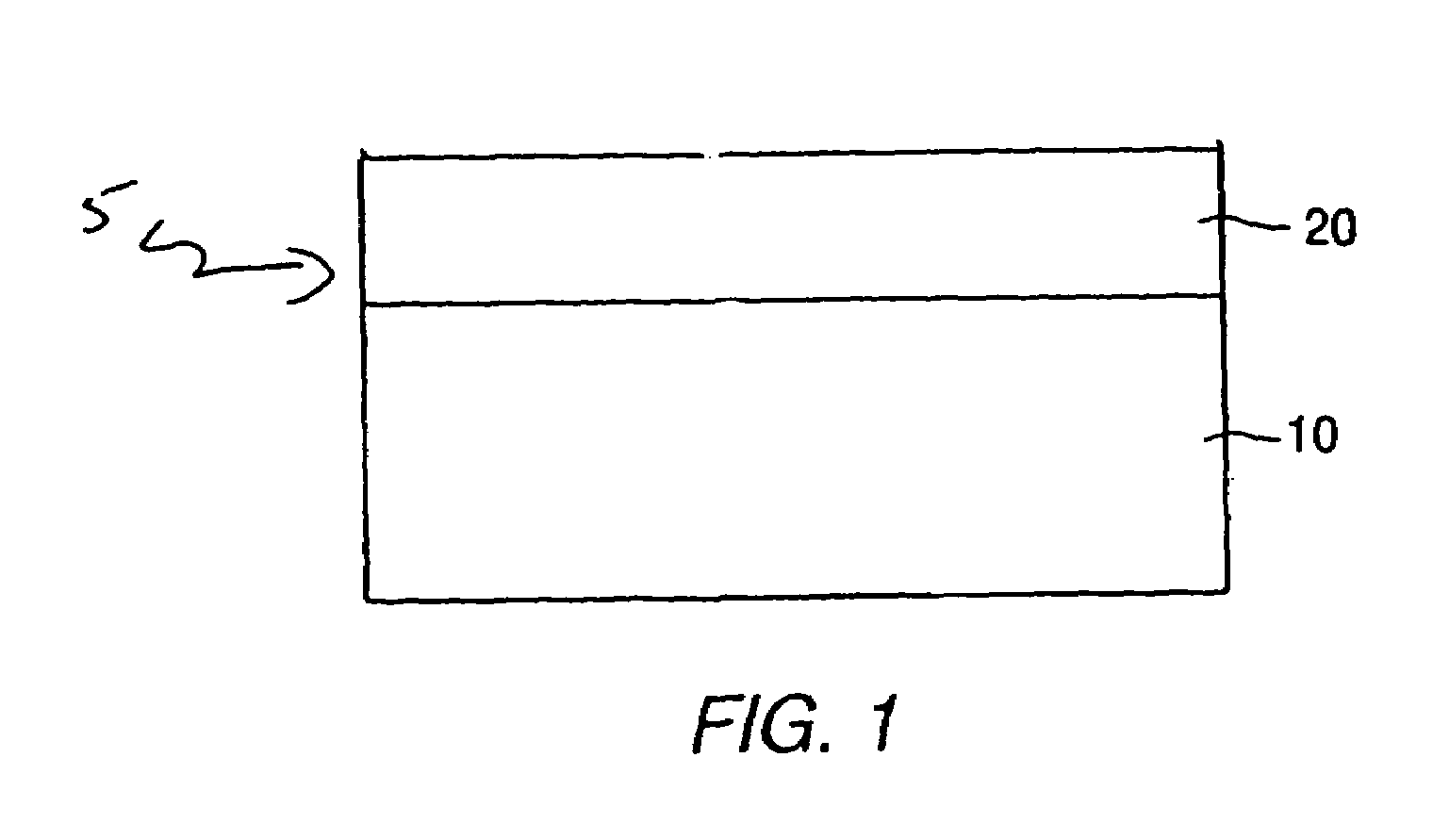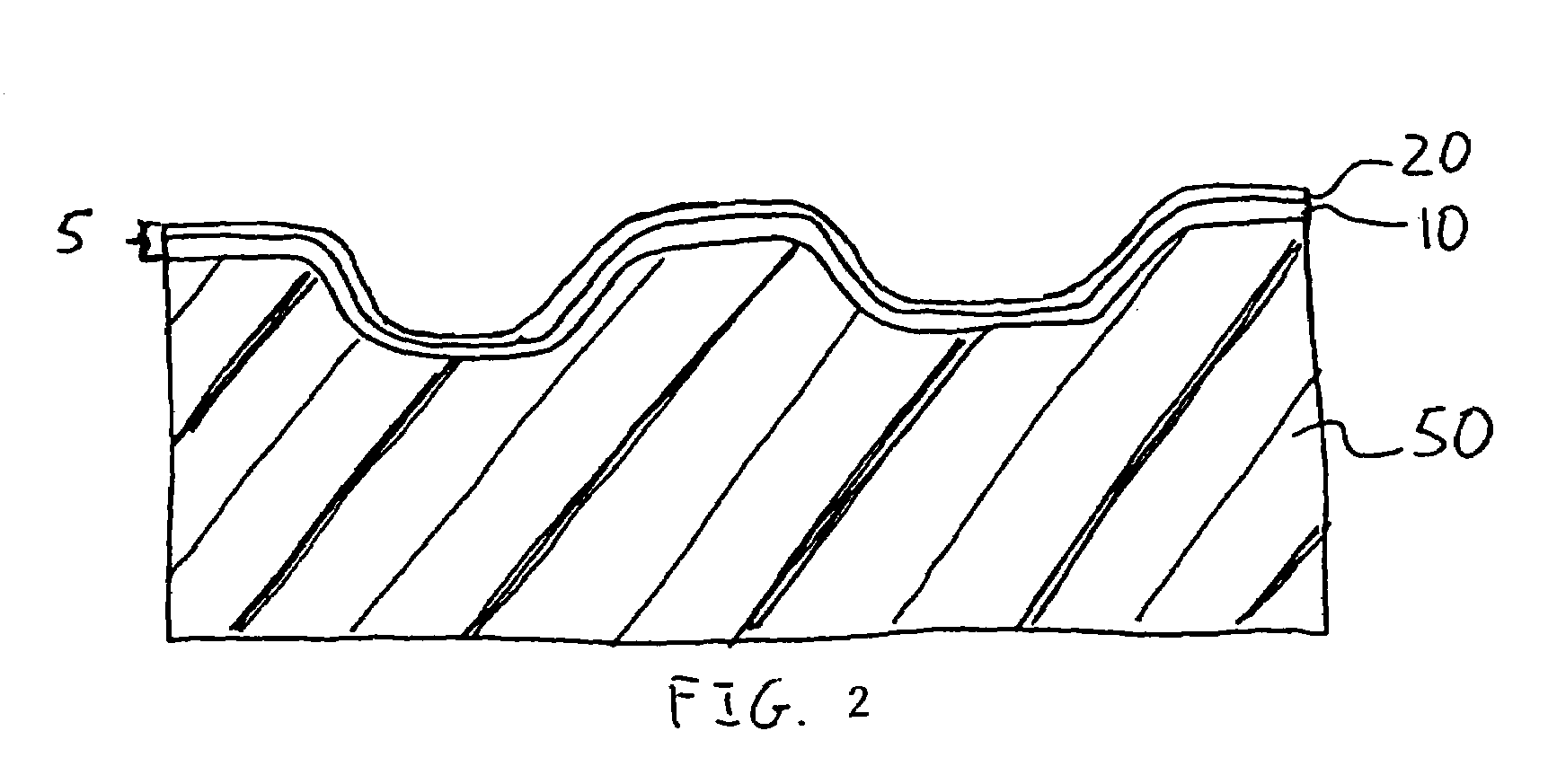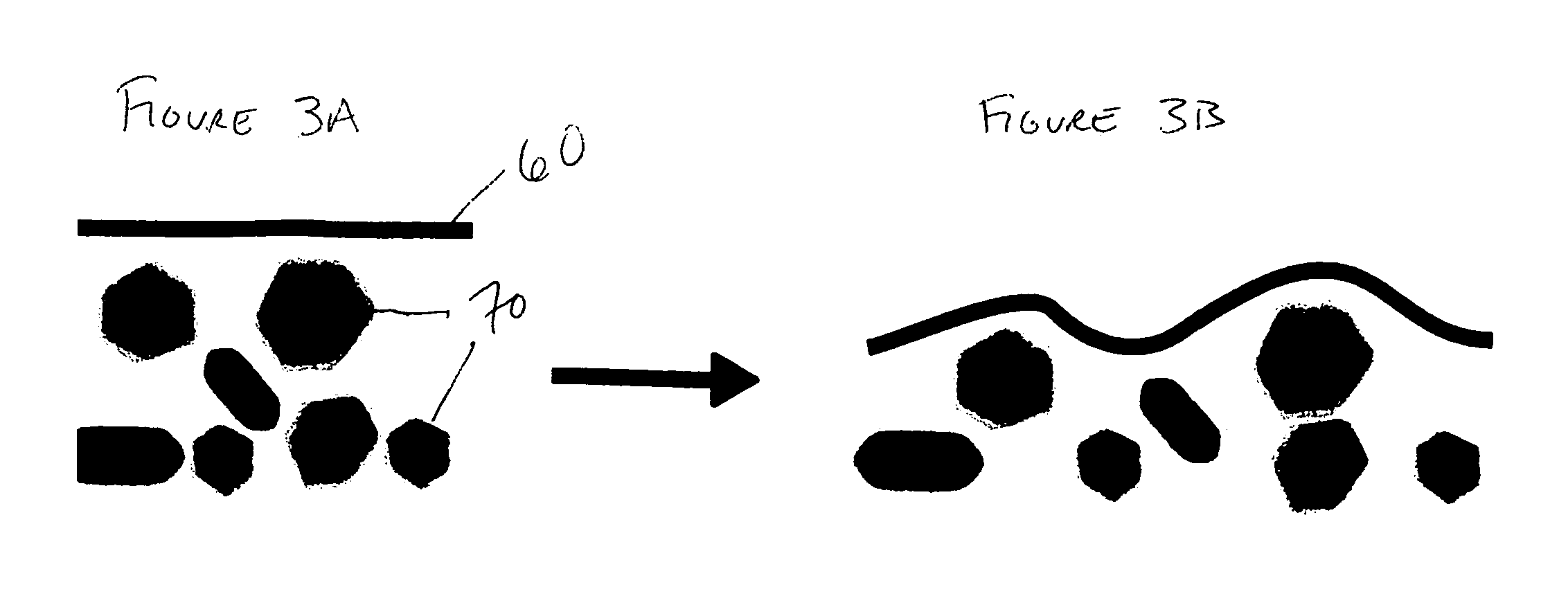Nanoparticle coatings for flexible and/or drawable substrates
a technology of flexible and/or drawable substrates and nanoparticles, which is applied in the direction of synthetic resin layered products, transportation and packaging, ceramic layered products, etc., can solve the problems of appearance and performance problems, negative effects of nanoparticles on the function and appearance of the coating, and large surface area of nanoparticles, so as to minimize surface distortion, improve the effect of withstandability and high gloss
- Summary
- Abstract
- Description
- Claims
- Application Information
AI Technical Summary
Benefits of technology
Problems solved by technology
Method used
Image
Examples
example 1
Polyurethane / Urea Prepolymer
[0074]This example describes the preparation of a polyurethane / urea prepolymer that was subsequently used to form the aqueous composite microparticles of Example 6. The polyurethane / urea prepolymer was prepared from a batch of the following mixture of ingredients in the ratios indicated:
[0075]
IngredientsEquivalentsWeight (grams)Charge IN-methyl pyrrolidinone269.8Hydroxyethyl methacrylate (HEMA)0.7091.1Dimethylolpropionic acid (DMPA)3.50234.7Triphenyl phosphite2.2Dibutyltin dilaurate2.2Butylated hydroxytoluene2.2Charge IIPoly (butylene oxide)11.40700.0Charge IIIMethylene bis(4-cyclohexylisocyanate)8.401100.4Charge IVButyl methacrylate481.8Charge VButyl acrylate642.5Charge VIDeionized water4263.3Dimethylethanolamine1.40124.7Diethanolamine0.7073.6Ethylenediamine1.4042.11Poly (butylene oxide) having a number average molecular weight of 1000.
[0076]Charge I was stirred in the flask at a temperature of 100° C. until all solids were dissolved. Charge II was added...
example 2
Polyurethane / Urea Prepolymer
[0077]This example describes the preparation of a polyurethane / urea prepolymer which was subsequently used to form the aqueous composite microparticles of Example 7. The polyurethane / urea was prepared from a batch of the following mixture of ingredients in the ratios indicated:
[0078]
IngredientsEquivalentsWeight (grams)Charge IN-methyl pyrrolidinone232.7Hydroxyethyl methacrylate1.0130.1Dimethylolpropionic acid4.0268.3Triphenyl phosphite2.6Dibutyltin dilaurate2.6Butylated hydroxytoluene2.6Charge IIPoly (butylene oxide)22.01000.0Charge III4,4′-methylenebis(cyclohexyl isocyanate)8.01048.0Charge IVButyl acrylate200.0Charge VDiethanolamine1.0105.1Charge VIMethyl methacrylate930.6Butyl acrylate730.62Poly (butylene oxide) having a number average molecular weight of 1000.
[0079]The polyurethane / urea was prepared in a four-neck round bottom flask equipped with an electronic temperature probe, mechanical stirrer, condenser, and a heating mantle. Charge I was stirred ...
example 3
Acrylic Dispersant
[0080]This example describes the preparation of an acrylic dispersant which was subsequently used to form the aqueous composite microparticles of Example 4. The acrylic dispersant was prepared from a batch of the following mixture of ingredients in the ratios indicated:
[0081]
IngredientsWeight (grams)Charge IMAGNESOL320.0Toluene120.0Charge II2,2′-dipyridyl7.5Copper (0) powder6.1Charge IIIPara-toluenesulfonyl chloride30.4Charge IVBenzylmethacrylate169.2Glycidyl isopropyl ether20.0Charge VMPEG (550) MA4888.3Toluene250.03MAGNESOL POLYSORB 30 / 40, a synthetic magnesium silicate available from The Dallas Group of America.4BISOMER MPEG 550MA, a methoxypolyethylene glycol methacrylate available from Laporte Specialty Organics.
[0082]Charge I was mixed in a 2 liter flask with air-stirrer, thermocouple and azeotropic distillation set-up. Charge I was heated to reflux and water was azeotroped off. Charge I was then cooled and put under a nitrogen blanket.
[0083]Charges II and II...
PUM
| Property | Measurement | Unit |
|---|---|---|
| thickness | aaaaa | aaaaa |
| elongation | aaaaa | aaaaa |
| wt % | aaaaa | aaaaa |
Abstract
Description
Claims
Application Information
 Login to View More
Login to View More - R&D
- Intellectual Property
- Life Sciences
- Materials
- Tech Scout
- Unparalleled Data Quality
- Higher Quality Content
- 60% Fewer Hallucinations
Browse by: Latest US Patents, China's latest patents, Technical Efficacy Thesaurus, Application Domain, Technology Topic, Popular Technical Reports.
© 2025 PatSnap. All rights reserved.Legal|Privacy policy|Modern Slavery Act Transparency Statement|Sitemap|About US| Contact US: help@patsnap.com



